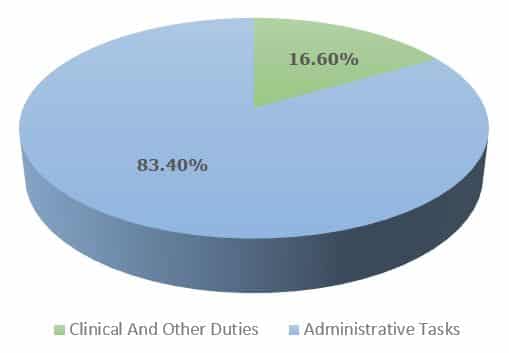The Essential Role Of Virtual Medical Administrative Assistants In Healthcare
In today’s fast-paced healthcare environment, efficient administrative support is crucial. Virtual medical administrative assistants improve healthcare operations by offering a range of administrative assistant services that streamline workflows, allowing healthcare professionals to focus more on patient care.
Additionally, virtual medical administrative assistants facilitate the integration of technology within healthcare systems, enhancing tasks like medical coding and appointment scheduling.
This post explores the importance of virtual administrative support and highlights virtual medical administrative assistant benefits and efficiency. Integrating medical virtual assistants into healthcare practices can significantly enhance operational efficiency and patient care.
Understanding The Role Of Virtual Medical Administrative Assistants
Remote medical administrative support professionals are skilled experts who handle various tasks remotely, including scheduling appointments, managing patient records, medical coding, and processing insurance claims. They are capable of handling appointment scheduling at all hours, providing immediate access to booking appointments and managing other inquiries. Additionally, virtual assistants play a crucial role in insurance verifications, streamlining office operations and freeing up staff resources.
By offering these administrative assistant services remotely, a Medical Virtual Assistant reduces the workload on in-house staff, leading to more efficient healthcare delivery. Effective patient data management is also a key aspect, ensuring accuracy, organization, and compliance with data protection laws.
(2020) revealed that primary care physicians (PCPs) spend a significant portion of their time on tasks that could be delegated. The study found that administrative work is not central to PCPs’ professional roles, leading to job dissatisfaction. Delegating such “below license” tasks, such as scheduling or managing insurance issues, to remote administrative support not only improves efficiency but also prevents physician burnout.
The Growing Demand For Virtual Administrative Support In Healthcare
The demand for virtual administrative support is rapidly increasing in the healthcare industry. Practices are realizing the value of having a dedicated team of virtual assistants who manage day-to-day tasks, freeing up time for healthcare providers to focus on direct patient services. This ultimately enhances patient satisfaction and outcomes. Additionally, virtual administrative support contributes to improving patient engagement by allowing healthcare providers to dedicate more time to personalized medical attention.
The rise of remote healthcare support has further driven the demand for a Medical Virtual Assistant, as they can provide essential services from any location, including support for scheduling and managing medical procedures.
The study also highlighted that doctors in large or hospital-owned practices, as well as those using electronic medical records (EMRs), face higher administrative burdens.
More time spent on administrative tasks is associated with lower career satisfaction, even when income and other factors are controlled.
These findings highlight the growing need for remote medical administrative support to manage these tasks effectively. By leveraging virtual administrative assistance, healthcare providers can reduce the administrative burden and ensure that delivering quality healthcare remains the top priority. This also enhances direct patient interaction, improving the overall quality of care.
Key Benefits Of Hiring A Virtual Medical Administrative Assistant
-
Increased Efficiency: Remote healthcare administrative professionals handle routine tasks, allowing healthcare providers to focus more on clinical duties, leading to better outcomes and higher satisfaction. By minimizing billing errors, virtual assistants help improve revenue cycle management and ensure that claims are properly processed. Additionally, virtual assistants provide appointment reminders as part of their service, contributing to stronger patient-provider relationships and improved patient retention.
-
Cost-Effective Solution:
Hiring a virtual assistant is often more cost-effective than employing full-time in-house staff. With virtual administrative support, medical practices can access skilled professionals without incurring additional overhead costs. Virtual assistants enhance the efficiency of a medical practice by handling documentation, research support, and patient inquiries, enabling staff to concentrate more on clinical responsibilities and operational management.
-
Scalability and Flexibility: As your practice grows, so do your administrative needs. Remote healthcare office support offers flexibility, allowing you to scale your support without needing more office space. Virtual assistants also play a crucial role in managing treatment plans and ensuring medication adherence, especially for chronic conditions.
-
Reduced Physician Burnout: Delegating administrative tasks to a Medical Virtual Assistant reduces the risk of physician burnout. This enables doctors to concentrate on what they do best—caring for patients.
Implementing virtual administrative support directly impacts patient care quality. Efficient management of office operations allows healthcare providers to spend more time with patients, leading to better patient experiences and more accurate care.
Effective management of patient records and timely processing of insurance claims prevents delays in patient care. Moreover, when routine responsibilities are delegated to virtual assistants, the healthcare team can utilize their skills better.
Physicians focus on diagnosis and treatment, while a Medical Virtual Assistant handles essential administrative duties. This collaborative approach creates a more efficient healthcare system.
Time Spent by U.S. Physicians in a Workweek

Among specialists, psychiatrists spend the most time on administration at 20.3%, followed by internists and family/general practitioners, both at 17.3%. Pediatricians spend the least amount of time on administrative tasks, dedicating 14.1% of their professional time to these activities.
Why Your Practice Needs Virtual Administrative Support
If your practice struggles with increasing administrative demands, it might be time to consider virtual administrative support. Medical practices are increasingly adapting to technological advancements, particularly through the use of Virtual Medical Assistants (VMAs) and intelligent automation solutions. The benefits are clear: improved efficiency, cost savings, and reduced burnout risk for healthcare providers. Virtual assistants can take over time-consuming office duties, allowing healthcare providers to focus on patient care.
Virtual assistants also play a crucial role in supporting medical practitioners by gathering important information and summarizing research articles, which helps ensure that practitioners stay informed about the latest advancements in their field.
Outsourcing office responsibilities to a virtual team ensures that your practice runs smoothly, even during peak times. Virtual assistants are available to provide support whenever needed, ensuring that your patients receive the best care possible.
Key Features of Virtual Medical Assistants
Remote healthcare assistants are professionals who provide both administrative and clinical services to healthcare providers from a distance. Leveraging digital tools and telecommunication technology, they perform duties traditionally handled by on-site medical assistants.
Key features of these remote professionals include their proficiency in managing office responsibilities such as scheduling appointments, handling patient communication, and maintaining patient records. Additionally, they offer clinical support through medical data entry, medical coding, and medication reminders.
Trained to adhere to HIPAA regulations, remote healthcare assistants ensure the security and integrity of patient data. By incorporating virtual healthcare assistance into their practice, medical professionals can enhance patient care, improve patient satisfaction, and increase operational efficiency. These professionals play a crucial role in streamlining administrative tasks and overall operations, allowing clinical teams to focus more on delivering quality care.
Patient Engagement and Communication
Remote medical support professionals play a vital role in strengthening patient interaction and communication in healthcare practices, significantly improving the patient experience by fostering better patient-provider relationships.
They handle patient inquiries, provide pre-appointment information, and offer personalized support to patients, ensuring that each interaction is smooth and informative. By facilitating effective communication between patients and medical teams, these remote assistants contribute to improved patient satisfaction and health outcomes.
In addition to managing texts and emails, a Medical Virtual Assistant also makes phone calls to enhance patient communication, further contributing to a positive patient experience.
Streamlining routine office duties allows healthcare professionals to focus more on direct patient care, delivering quality care without the distraction of clerical responsibilities. Skilled remote assistants also manage patient data efficiently, ensuring that private health details are handled securely and in compliance with HIPAA regulations. This comprehensive support system not only strengthens patient connections but also ensures that healthcare practices operate smoothly and efficiently.
What we provide
Virtual Medical Administrative Assistant
Medical Virtual Receptionist
Remote Medical Scribe
Medical Billing Virtual Asssistant
Executive VA & Virtual Office Manager
Virtual Dental Administrative Assistant
Dental Virtual Receptionist
Remote Dental Scribe
Dental Billing Virtual Assistant
Virtual Dental Executive Assistant
Patient Care Coordinator
Prior-Authorization
Provider Support
Telehealth Specialist
Telephone Triage
Remote Patient Monitoring
Data Security and Medical Records
Virtual medical assistants are trained to handle patient data securely and maintain the integrity of medical records. They ensure that electronic health records are up-to-date, accurate, and accessible to authorized healthcare professionals, which is crucial for delivering timely and effective patient care. Certain tasks require human judgment, and virtual assistants excel in these areas by providing the nuanced understanding and emotional intelligence needed in sensitive contexts like healthcare. Implementing robust security measures, virtual medical assistants prevent data breaches and protect confidential health information.
Adhering to strict HIPAA regulations, virtual medical assistants follow guidelines for handling confidential patient data, ensuring that all details are managed with the highest level of security. By maintaining the security and integrity of medical records, virtual medical assistants, with their depth in human judgment, enable medical professionals to focus on delivering quality care and improving patient outcomes, knowing that health information is in safe hands.
Efficiency and Productivity
Virtual medical assistants significantly boost efficiency and productivity in healthcare practices. By taking over essential office duties such as scheduling appointments, handling patient inquiries, and managing patient records, they free up valuable time for healthcare professionals to concentrate on direct patient care. This shift not only leads to better patient results but also increases patient satisfaction and engagement.
Streamlining office responsibilities reduces the administrative burdens on healthcare professionals, allowing them to allocate resources more effectively. Virtual medical assistants bring expertise in managing healthcare operations, helping to improve practice efficiency and overall well-being. Their support ensures that medical teams can deliver high-quality care without the distraction of routine clerical duties.
Cost Savings
Hiring virtual medical assistants offers a cost-effective solution for healthcare practices. These professionals can work on a contractual basis, eliminating the need for additional physical office space and related overhead expenses. By reducing administrative burdens, minimizing billing errors, and improving insurance verification processes, virtual medical assistants help medical practices save money and reduce costs.
Streamlining daily office operations and enhancing practice efficiency further contribute to cost savings. Virtual medical assistants also play a vital role in preventing costly data breaches by ensuring the security and integrity of confidential health information. Their expertise in handling medical office responsibilities allows medical teams to improve their bottom line and allocate resources more effectively.
Implementing Virtual Medical Assistants
Implementing a medical virtual assistant in a healthcare practice requires careful planning and consideration. Healthcare teams must assess their administrative needs and identify areas where virtual medical assistants can add value. Proper training is essential to ensure that virtual medical assistants are equipped to handle sensitive patient information and complex administrative tasks.
A remote medical assistant plays a significant role in improving efficiency and reducing provider burdens by managing various clerical and clinical duties remotely. Successful implementation also depends on effective communication and collaboration between remote assistants, healthcare professionals, and administrative staff.
By streamlining day-to-day operations and strengthening patient connections, these remote professionals can help healthcare practices improve operational efficiency and reduce administrative burdens, ultimately leading to better patient care and satisfaction.
Best Practices for Virtual Medical Assistants
To ensure the effectiveness of virtual medical assistants, they should be properly trained and certified to handle administrative tasks and patient data. Familiarity with electronic health records, medical billing, and insurance verification processes is crucial. Effective communication skills are essential for interacting with patients, healthcare professionals, and administrative staff.
Remote healthcare assistants play a vital role in tracking and scheduling patient visits, ensuring that treatment needs are assessed and the requisite frequency of visits is determined based on the severity of conditions. They should be capable of handling complex tasks such as scheduling appointments, medication reminders, and medical data entry.
Adhering to strict guidelines for handling sensitive patient information and maintaining the security and integrity of medical records is paramount. By following these best practices, remote healthcare assistants can significantly enhance the efficiency and effectiveness of healthcare practices.
Common Challenges and Solutions
One common challenge faced by healthcare practices when implementing virtual medical assistants is ensuring the security and integrity of sensitive health information. To address this challenge, healthcare providers can implement robust security measures, such as encryption and secure data storage. Another challenge is ensuring effective communication and collaboration between virtual assistants, healthcare professionals, and administrative staff.
Establishing clear communication channels and protocols for remote medical support staff can help overcome this challenge. By addressing these challenges and implementing remote medical assistants effectively, healthcare practices can improve operational efficiency, reduce administrative burdens, and enhance patient satisfaction and health outcomes.
Digital Transformation
The integration of virtual medical assistants is a pivotal aspect of digital transformation in the healthcare industry. These professionals assist medical practitioners in transitioning to digital systems, such as electronic health records, and improving data management. They also provide virtual healthcare services, including telemedicine support, helping medical teams expand their reach and improve patient access to care.
With the use of artificial intelligence and other digital technologies, remote healthcare assistants strengthen patient interaction, streamline operational workflows, and improve patient care. Embracing digital transformation allows medical practices to boost efficiency, reduce costs, and elevate the overall patient experience. These remote professionals are at the forefront of this transformation, providing the expertise and support needed to navigate the complex healthcare landscape.
Maximizing The ROI Of Virtual Medical Administrative Assistants
To maximize the benefits of virtual medical administrative assistants, consider the following strategies:
-
Tailored Training: Ensure your virtual assistant is trained in your specific medical specialty and EHR system to enhance efficiency from the start. Tailored training is crucial for medical professionals to ensure that the virtual assistant can effectively support their unique administrative needs.
-
Choose the Right Model: Evaluate whether an hourly rate or a subscription model best suits your practice’s needs, considering your work volume and budget. By choosing the right model, practices can allocate resources more efficiently and invest in patient care services. Additionally, virtual assistants can manage scheduling and appointment requests for medical offices, ensuring patients receive reminders for follow-ups and other healthcare appointments.
-
Monitor Performance: Regularly assess your virtual assistant’s performance by tracking time saved and additional revenue generated to ensure you’re maximizing your investment.
Conclusion: The Future Of Healthcare With Virtual Administrative Support
As healthcare evolves, the role of remote medical administrative professionals will become even more important. These specialists provide essential administrative assistant services that enhance healthcare delivery efficiency and improve patient outcomes.
The integration of artificial intelligence in virtual medical assistants will further enhance their capabilities and efficiency. Integrating virtual administrative support into your practice ensures that your team works at its highest potential, offering the best possible care.
At Medical Staff Relief, we specialize in connecting healthcare providers with highly skilled virtual medical administrative assistants. Our team, sourced from the Philippines and Latin America, is trained to meet the unique needs of US-based practices. We ensure that your practice receives the highest quality support.
By carefully considering costs and benefits, and choosing the right service model, practices can make informed decisions that align with their goals. Ultimately, investing in remote medical administrative support can lead to significant financial returns and improved patient care.



 Hiring a virtual assistant is often more cost-effective than employing full-time in-house staff. With virtual administrative support, medical practices can access skilled professionals without incurring additional overhead costs. Virtual assistants enhance the efficiency of a medical practice by handling documentation, research support, and patient inquiries, enabling staff to concentrate more on clinical responsibilities and operational management.
Hiring a virtual assistant is often more cost-effective than employing full-time in-house staff. With virtual administrative support, medical practices can access skilled professionals without incurring additional overhead costs. Virtual assistants enhance the efficiency of a medical practice by handling documentation, research support, and patient inquiries, enabling staff to concentrate more on clinical responsibilities and operational management.

